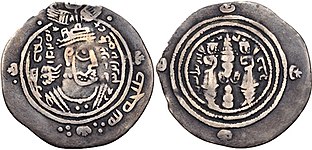Marwan I, Date of Birth, Place of Birth, Date of Death
TweetMarwan I
Umayyad Caliph
 Date of Birth: 28-Mar-0623
Date of Birth: 28-Mar-0623
 Place of Birth: Mecca, Makkah Region, Saudi Arabia
Place of Birth: Mecca, Makkah Region, Saudi Arabia
Date of Death: 07-May-0685
Profession: writer
Zodiac Sign: Aries 
About Marwan I
- Marwan ibn al-Hakam ibn Abi al-As ibn Umayya (Arabic: ????? ?? ????? ?? ??? ????? ?? ?????, romanized: Marwan ibn al-?akam ibn Abi al-?As ibn Umayya), commonly known as Marwan I (ca.
- 623–626 – April/May 685) was the fourth Umayyad caliph, ruling for less than a year in 684–685.
- He founded the Marwanid ruling house of the Umayyad dynasty, which replaced the Sufyanid house after its collapse in the Second Muslim Civil War and remained in power until 750.
- Marwan was the secretary and right hand of his cousin Caliph Uthman (r.
- 644–656) and was wounded fighting the rebel siege of Uthman's house, in which the caliph was slain.
- In revenge for his cousin's death, Marwan killed a leading companion of the Islamic prophet Muhammad, Talha ibn Ubayd Allah, whom he held culpable, during the Battle of the Camel in 656 when they both fought in the army of Muhammad's wife A'isha against Muhammad's cousin Caliph Ali (r.
- 656–661).
- Marwan later served as governor of Medina under his distant kinsman Caliph Mu'awiya I (r.
- 661–680), founder of the Umayyad Caliphate.
- During the reign of Mu'awiya's son and successor Yazid I (r.
- 680–683), Marwan organized the defense of the Umayyad realm in the Hejaz (western Arabia) against the local opposition.
- After Yazid died in November 683, the Mecca-based rebel Abd Allah ibn al-Zubayr declared himself caliph and expelled Marwan, who took refuge in Syria, the center of Umayyad rule.
- With the death of the last Sufyanid caliph Mu'awiya II in 684, Marwan, encouraged by the ex-governor of Iraq Ubayd Allah ibn Ziyad, volunteered his candidacy for the caliphate during a summit of pro-Umayyad tribes in Jabiya.
- The tribal nobility, led by Ibn Bahdal of the Banu Kalb, elected Marwan and together they defeated the pro-Zubayrid Qays tribes at the Battle of Marj Rahit in August. In the months that followed, Marwan reasserted Umayyad rule over Egypt, Palestine and northern Syria, whose governors had defected to Ibn al-Zubayr's cause, while keeping the Qays in check in Upper Mesopotamia.
- He dispatched an expedition led by Ibn Ziyad to reconquer Zubayrid Iraq, but died while it was underway in the spring of 685.
- Before his death, Marwan firmly established his sons in positions of power: Abd al-Malik was designated his successor, Abd al-Aziz was made governor of Egypt and Muhammad oversaw military command in Upper Mesopotamia.
- Though Marwan was stigmatized as an outlaw and a father of tyrants in later anti-Umayyad tradition, the historian Clifford E.
- Bosworth asserts that the caliph was a shrewd, capable and decisive military leader and statesman who laid the foundations of continued Umayyad rule for a further sixty-five years.
Read more at Wikipedia

